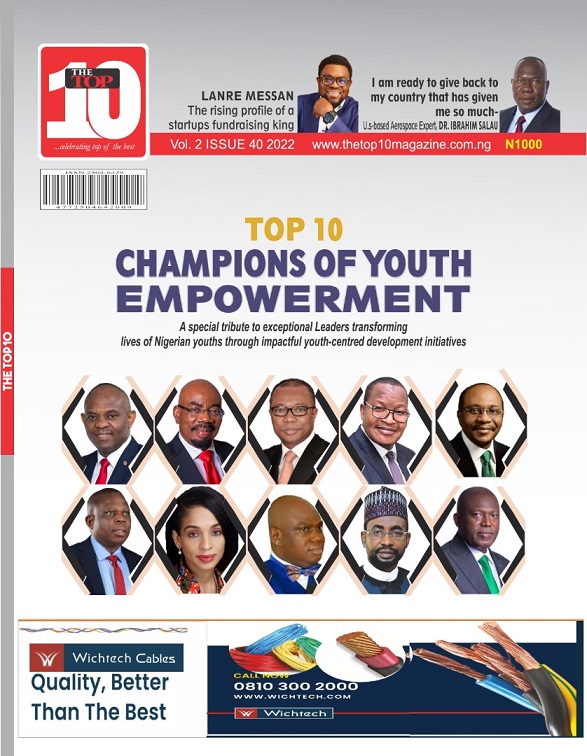Prof. Umar Garba Danbatta, executive vice chairman, Nigerian Communication Commission, has played an extensive role in the empowerment of Nigerian youth through a number of Information Communication Technology-based (ICT) initiatives he has put forward at the commission.
He explained that the resolve of the Commission to pursue vigorously a bouquet of ICT programmes focused on the youth is based on the projected opportunity for the youth in the emerging ICT-based labour market.

Looking ahead, Danbatta reckons that 70 per cent of the new value to be created in the economy over the coming decades will be based on digitally-enabled platform business models. Planning ahead therefore, he assures the nation of implementing diligently all sectoral interventions focused on ICT-based youth empowerment.
Current trends and projections indicate that economies around the world will continue unstoppably towards digitalisation with corresponding growth in operators’ revenue and investment. By the growth indices from NCC, the fourth generation (4G) connections are expected to reach 57 per cent, the fifth generation (5G) is envisaged to have 1.8 billion connections and usage of smartphones is projected to hit 81 per cent.
Internet of Things (IoT) is expected to advance from 13.1 billion to 24 billion connections and the mobile industry’s contribution to Gross Domestic Product is expected to grow by at least 5.1 per cent by 2025.
Considering the foregoing, Danbatta sees huge, incredible opportunities for the youth to build flourishing businesses. “Therefore, while NCC is working collaboratively and strategically with its supervising ministry, Federal Ministry of Communications and Digital Economy, it is also working with young Nigerians to prepare them for harnessing these opportunities for personal and national prosperity”, he assured.
NCC has therefore developed robust youth empowerment initiatives through the ICT eco-system with the aim of creating a digitally skilled workforce that would fit into the evolving Digital Economy Project of Nigeria. He assures that NCC is committed to fostering partnership and collaboration with technology hubs and start-ups in order to accelerate innovation and creation of a digitally skilled workforce for the nation’s industrial growth and sustainable development.
In positioning Nigeria to tap deeply into the huge prospects, NCC has instituted a number of initiatives and interventions for youth empowerment in what Danbatta has described as “a unique and unprecedented institutionalisation of strategic collaboration and partnerships”.
The initiatives include the ICT Hubs Support and Engagement, which is a forum that brings together key stakeholders and the youth in Nigerian tech-ecosystem to deliberate and suggest policy framework and strategies that could further develop the sector to catalyse improved local content in the ICT/telecommunications sector.
In place also is an annual ICT Innovation Competition and Exhibition that aims at facilitating sustainable digital start-ups development through a platform to showcase their digital innovative solutions.

Another initiative of NCC is an annual forum that is designed to challenge start-ups and tech hubs in Nigeria to produce impactful and sustainable innovative solutions that will address common societal challenges using digital technologies.
There is also the ICT Park Project being built across the six geo-political zones of the country to boost digital skills among young people, promote innovation, provide jobs for young Nigerians and ultimately support the federal government’s digital agenda. The focus of the project is to harness and optimise the youth’s creative energy for development.
Part of the initiatives includes the NCC National Essay Competition, which engages undergraduates in Nigerian tertiary institutions to explore and enhance research capacity at that level. In addition to that are two school support programmes – Digital Awareness Programme and Advanced Digital Appreciation Programme for Tertiary Institutions.
The first is a special intervention initiated as a Corporate Social Responsibility project to address digital information knowledge gap in the country. The second is instituted to bridge the knowledge skill gap in institutions higher of learning, largely targeted at the youth and students.
Having done an extensive work in charting the course of ICT-based opportunities that are emerging in the economy, Danbatta has further identified the emergent segments for the youth to consciously begin to take exploratory actions. The technology segments, according to him, include Blockchain, Artificial Intelligence, Cloud computing, Internet of Things and Big Data.
He also draws due attention of the youth and students to overlapping variables of the technology segments that are leading the way of the world into the future. These include hyper-connectivity, super-computing, cyber security and smarter world such as robotics, 3D printing and sensors.






